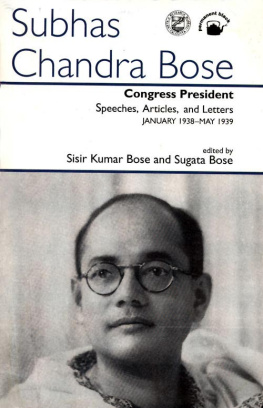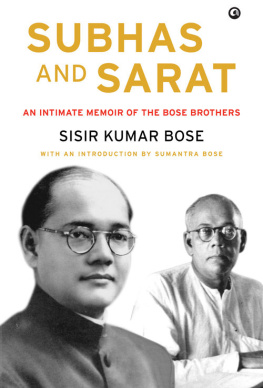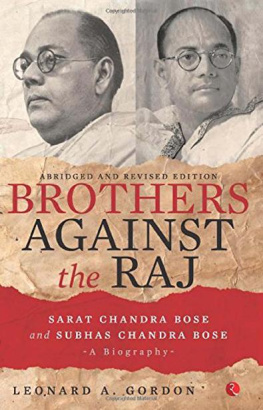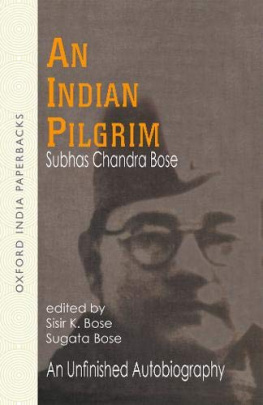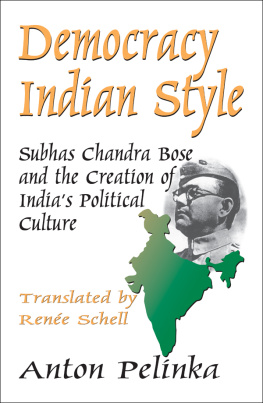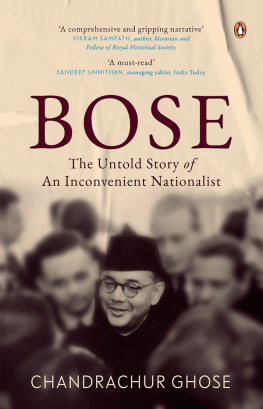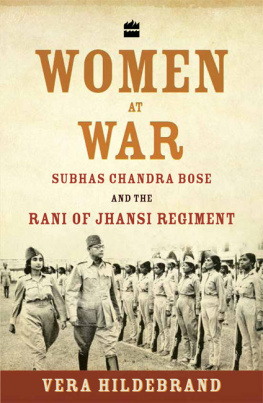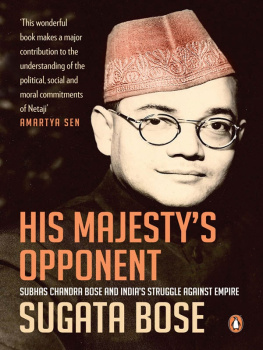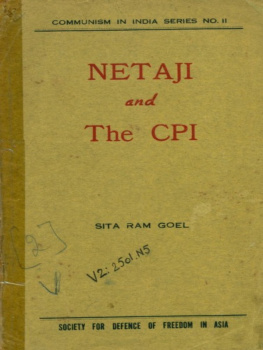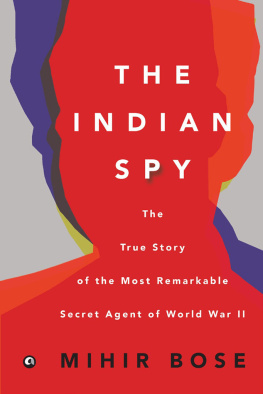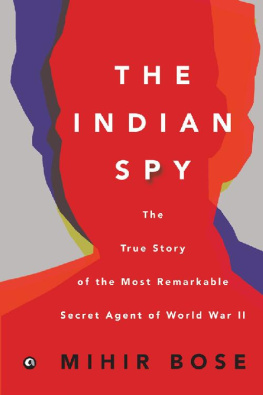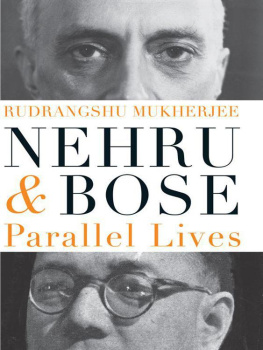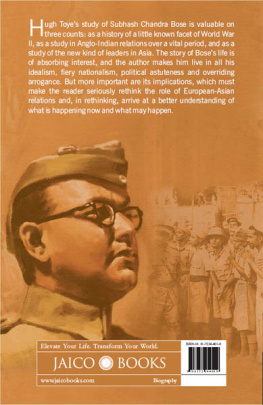Sisir Kumar Bose - Subhas Chandra Bose- Congress President: Speeches, Articles, and Letters January 1938–May 1939
Here you can read online Sisir Kumar Bose - Subhas Chandra Bose- Congress President: Speeches, Articles, and Letters January 1938–May 1939 full text of the book (entire story) in english for free. Download pdf and epub, get meaning, cover and reviews about this ebook. year: 2018, publisher: Orient BlackSwan, genre: Politics. Description of the work, (preface) as well as reviews are available. Best literature library LitArk.com created for fans of good reading and offers a wide selection of genres:
Romance novel
Science fiction
Adventure
Detective
Science
History
Home and family
Prose
Art
Politics
Computer
Non-fiction
Religion
Business
Children
Humor
Choose a favorite category and find really read worthwhile books. Enjoy immersion in the world of imagination, feel the emotions of the characters or learn something new for yourself, make an fascinating discovery.
- Book:Subhas Chandra Bose- Congress President: Speeches, Articles, and Letters January 1938–May 1939
- Author:
- Publisher:Orient BlackSwan
- Genre:
- Year:2018
- Rating:4 / 5
- Favourites:Add to favourites
- Your mark:
- 80
- 1
- 2
- 3
- 4
- 5
Subhas Chandra Bose- Congress President: Speeches, Articles, and Letters January 1938–May 1939: summary, description and annotation
We offer to read an annotation, description, summary or preface (depends on what the author of the book "Subhas Chandra Bose- Congress President: Speeches, Articles, and Letters January 1938–May 1939" wrote himself). If you haven't found the necessary information about the book — write in the comments, we will try to find it.
Sisir Kumar Bose: author's other books
Who wrote Subhas Chandra Bose- Congress President: Speeches, Articles, and Letters January 1938–May 1939? Find out the surname, the name of the author of the book and a list of all author's works by series.
Subhas Chandra Bose- Congress President: Speeches, Articles, and Letters January 1938–May 1939 — read online for free the complete book (whole text) full work
Below is the text of the book, divided by pages. System saving the place of the last page read, allows you to conveniently read the book "Subhas Chandra Bose- Congress President: Speeches, Articles, and Letters January 1938–May 1939" online for free, without having to search again every time where you left off. Put a bookmark, and you can go to the page where you finished reading at any time.
Font size:
Interval:
Bookmark:

Netaji: Collected Works
Volume 9
CONGRESS PRESIDENT
Speeches, Articles and Letters
January 1938May 1939
For our entire range of books please use search strings "Orient BlackSwan", "Universities Press India" and "Permanent Black" in store.

Netaji Collected Works Volume 9
CONGRESS PRESIDENT
Speeches, Articles,
and Letters
January 1938May 1939
Subhas Chandra Bose
edited by
Sisir Kumar Bose and Sugata Bose

Congress President: Speeches, Articles, and Letters January 1938May 1939
Published by
PERMANENT BLACK
Himalayana, Mall Road, Ranikhet Cantt,
Ranikhet 263645
Distributed by
Orient Blackswan Private Limited
Registered Office
3-6-752 Himayatnagar, Hyderabad 500 029 (A.P.), INDIA
e-mail:
Other Offices
Bengaluru, Bhopal, Chennai, Guwahati,
Hyderabad, Jaipur, Kolkata, Lucknow,
Mumbai, New Delhi, Noida, Patna, Vijayawada
Copyright NETAJI RESEARCH BUREAU 1995
First published in 1995
First paperback printing 2004
Second impression 2016
eISBN 978-81-7824-562-1
e-edition: First Published 2018
ePUB Conversion:
All rights reserved. No part of this publication may be reproduced, distributed, or transmitted in any form or by any means, including photocopying, recording, or other electronic or mechanical methods, without the prior written permission of the publisher, except in the case of brief quotations embodied in critical reviews and certain other noncommercial uses permitted by copyright law. For permission requests write to the publisher.
- 4. Congress Medical Mission to China: Boses public statement and appeal, 28 June 1938
Boses speech at University Institute Hall, 12 August 1938
Boses farewell message to Congress Medical Mission to China
Photographs
Acknowledgements
We would like to thank Professor Krishna Bose and Professor Leonard A. Gordon for editorial advice, Mr Kartic Chakraborty for secretarial assistance and Mr Naga Sundaram for archival support. We wish also to record our gratitude to Oxford University Press for their efficient handling of the publication process.
SISIR KUMAR BOSE
SUGATA BOSE
Editors Introduction
My personal view today, Subhas Chandra Bose said in an interview to Rajani Palme Dutt in January 1938, is that the Indian National Congress should be organised on the broadest anti-imperialist front, and should have the two-fold objective of winning political freedom and the establishment of a socialist regime. Bose arrived back in India on 23 January 1938, his 41st birthday, and during his tenure as Congress President worked towards the two-fold objective he had set himself.
This key volume of Boses Collected Works brings together his speeches, writings and letters from January 1938 until just after his resignation as Congress President on 29 April 1939. In these he deals with the themes of imperialism and nationalism, socialism, national planning, science, constitutional issues, Hindu-Muslim relations, the role of women, European politics, etc. Perhaps the single most important document included in this volume is the famous Presidential Address delivered at Haripura in February 1938. Written in a day at his Calcutta home on the eve of his departure for Haripura, the speech provided an incisive analysis of the strengths and weaknesses of the worldwide structure of British imperialism and an egalitarian vision of the socioeconomic reconstruction of free India. It was marked by a remarkable lack of rancour towards the colonial masters whom he challenged to transform the empire into a federation of free nations. Quoting Lenin on how reaction in Britain [wa]s strengthened and fed by the enslavement of a number of nations, Bose claimed:
We who are fighting for the political freedom of India and other enslaved countries of the British empire are incidentally fighting for the economic emancipation of the British people as well... once we have real self-determination, there is no reason why we should not enter into the most cordial relations with the British people.
While sounding a note of warning against accepting colonial constitutional devices designed to divide and deflect the anticolonial movement, Bose could see that the policy of divide and rule was by no means an unmixed blessing for the ruling power. Bose saw the principle of partition ingrained in the juxtaposition of autocratic princes and democratically elected representatives of British India, and called for uncompromising opposition to the federal part of the Government of India Act of 1935. If that scheme got rejected, Bose feared that the British would seek some other constitutional device for partitioning India and thereby neutralising the transference of power to the Indian people. But equally Bose could see Britain getting caught in the meshes of her own political dualism resulting from divisive policies, whether in India, Palestine, Egypt, Iraq or Ireland. He, therefore, resolved to urgently address the minorities question in India, advocating a policy of live and let live in matters religious and an understanding in matters economic and political. He also wanted justice done to the so-called depressed classes. While promoting cultural auto nomy for the different linguistic areas, Bose urged the acceptance of Hindustani (a mixture of Hindi and Urdu) in the Roman script as lingua franca. The objective of unifying India through a strong central government would have to be balanced by the imperative to put all the minority communities as well as the provinces at their ease, by allowing them a large measure of autonomy in cultural as well as governmental affairs.
Convinced of the need to be prepared for independence, Bose outlined his long-period programme for a Free India. The first problem to tackle, according to him, was increasing population. He was probably the first among Indias political leaders to articulate a policy of population control. As regards reconstruction, the principal problem would be how to eradicate poverty from our country. That would require a radical reform of our land system, including the abolition of landlordism. Agricultural indebtedness would have to be liquidated and provision made for cheap credit for the rural population. But to solve the economic problem agricultural improvement would not be enough and an ambitious plan for state-directed industrial development would be necessary. However much we may dislike modern industrialism and condemn the evils which follow in its train, Bose declared, we cannot go back to the pre-industrial era, even if we desire to do so. The state in independent India would, on the advice of a planning commission, have to adopt a comprehensive scheme for gradually socialising our entire agricultural and industrial system in the spheres of both production and appropriation.
Bose believed in 1938 that the Congress party could not be asked to wither away but, on the contrary, had a key role to play in the work of national reconstruction after independence. The existence of multiple parties and the democratic basis of the Congress Party, he trusted, would prevent the future Indian state becoming a totalitarian one. Inner-party democracy would also ensure that leaders are not thrust upon the people from above, but elected from below. Subsequent developments were soon to show that Boses views regarding the Congress partys commitment to internal democracy were overly optimistic. His opinions in favour of the Congresss granting collective affiliation to peasants and workers organizations, and being poised to take advantage of the international situation were not shared by several of his colleagues within the Congress.
Next pageFont size:
Interval:
Bookmark:
Similar books «Subhas Chandra Bose- Congress President: Speeches, Articles, and Letters January 1938–May 1939»
Look at similar books to Subhas Chandra Bose- Congress President: Speeches, Articles, and Letters January 1938–May 1939. We have selected literature similar in name and meaning in the hope of providing readers with more options to find new, interesting, not yet read works.
Discussion, reviews of the book Subhas Chandra Bose- Congress President: Speeches, Articles, and Letters January 1938–May 1939 and just readers' own opinions. Leave your comments, write what you think about the work, its meaning or the main characters. Specify what exactly you liked and what you didn't like, and why you think so.

